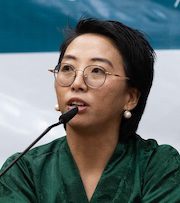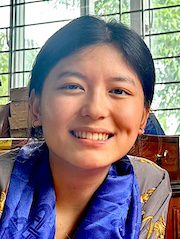Apr 6, 2025
A live online dialogue with Kunsang Dolma, Ph.D., and host Jhama Lhamo. In Tibetan language, with consecutive translation in English. A transcript of the translation is below.
Join us for a fascinating dialogue with Dr. Kunsang Dolma, a remarkable young Tibetan scholar and author. Hosted by Jhama Lhamo, this free live Internet broadcast will explore Dr. Dolma’s impressive journey, highlighting her academic achievements and published works in Tibetan Buddhism and Bön. The conversation will delve into both the challenges she has faced and the accomplishments she has attained as a Tibetan woman in academia.
Other viewing options: View on Facebook | View on the CyberSangha Community App | Explore or join the app now.
About the Presenters
 Kunsang Dolma, Ph.D., is a distinguished researcher, writer, and translator born in the Ngaba region of Amdo, Tibet. She holds a Ph.D. in Buddhist and Bön Abhidharma from Banaras Hindu University and has authored several books, including Analysis and Opinion; A Critical Analysis of Citta and Caitta in Bön Abhidharma and Abhidharmasamuccaya; and Critical Analysis on Exile Women’s Writers. Dr. Dolma is also recognized as the first translator of The Means of Attaining Enlightenment in 320 Verses of Bön Teaching by Meton Sherab Woeser (1058-1132 A.D.). She continues to make significant contributions to the fields of Buddhist and Bön philosophy, Tibetan literature, and Buddhist psychology.
Kunsang Dolma, Ph.D., is a distinguished researcher, writer, and translator born in the Ngaba region of Amdo, Tibet. She holds a Ph.D. in Buddhist and Bön Abhidharma from Banaras Hindu University and has authored several books, including Analysis and Opinion; A Critical Analysis of Citta and Caitta in Bön Abhidharma and Abhidharmasamuccaya; and Critical Analysis on Exile Women’s Writers. Dr. Dolma is also recognized as the first translator of The Means of Attaining Enlightenment in 320 Verses of Bön Teaching by Meton Sherab Woeser (1058-1132 A.D.). She continues to make significant contributions to the fields of Buddhist and Bön philosophy, Tibetan literature, and Buddhist psychology.
 Jhama Lhamo (host), currently a resident student at Long Island University, Brooklyn, is pursuing a master’s degree in public health and biomedical sciences in New York. She completed her high school education at the Tibetan Children’s Village School in Bangalore, South India, and earned her bachelor’s degree from Shoolini University in Himachal Pradesh, India. Additionally, in 2023 she produced a short documentary film spotlighting the Bodhisattvas in Action (BIA) Institute, a non-governmental organization situated in Gokarneshwar, Nepal.
Jhama Lhamo (host), currently a resident student at Long Island University, Brooklyn, is pursuing a master’s degree in public health and biomedical sciences in New York. She completed her high school education at the Tibetan Children’s Village School in Bangalore, South India, and earned her bachelor’s degree from Shoolini University in Himachal Pradesh, India. Additionally, in 2023 she produced a short documentary film spotlighting the Bodhisattvas in Action (BIA) Institute, a non-governmental organization situated in Gokarneshwar, Nepal.
Translation Summary
We extend special thanks to Jhama Lhamo for compiling this summary translation of Dr. Kunsang Dolma’s remarks during the talk.
I grew up in Tibet until i was 9 years old, —it gave me a deep appreciation for community, spirituality, and the connection between people and nature. The environment and traditions around me helped shape how I see the world today. At the same time, being a young Tibetan girl with academic goals wasn’t easy. Access to education, especially in areas like Bön philosophy, was pretty limited. There were not many resources, and girls were often expected to focus on home life rather than pursue higher studies. For those who did want to go further, it usually meant leaving Tibet and facing challenges like language, finances, and adjusting to a new culture.
I’ve been really fortunate to have inspiring mentors like Professor Lobsang Norbu Shastri, Professor Tenzing Gory, and Professor Phuntso Nyime. And my mom has been a huge influence — her dedication to Bön and her hardworking nature really pushed me to keep going, even when things were tough. These experiences are a big part of why I chose to study Tibetan culture and Bön philosophy. For me, it’s not just about academics — it’s about bridging tradition and modern knowledge, and creating more opportunities for younger Tibetan women to access this kind of learning. That’s something I care deeply about and hope to contribute to through my work.
As a Tibetan woman in academia, especially in the fields of Bön and Buddhist philosophy, my journey has been incredibly meaningful — but also full of challenges that are both personal and structural.
First, there’s the cultural and linguistic aspect. Tibetan philosophical traditions like Bön are still underrepresented in mainstream academic spaces. Western frameworks often focus more on certain Buddhist traditions, which means Bön studies don’t always get the attention or support they deserve. That can make access to resources and institutional recognition quite difficult. Secondly, coming from a tradition where most scholarly roles — both in monastic settings and academic institutions — have historically been held by men, I’ve had to navigate implicit biases. As a woman doing philosophical and doctrinal research, my work hasn’t always been taken seriously at first. People sometimes assume that female scholars, especially in Buddhist philosophy, are more focused on anthropological or cultural angles rather than engaging deeply in philosophical discourse.
But over time, I’ve worked hard to bridge those gaps. Publishing in both Tibetan and English has helped me reach diverse academic audiences while staying true to my cultural roots. I’ve published 26 articles and authored four books. That body of work has helped shift perceptions, and I’ve gradually earned more credibility and respect in the field. Overall, while the path hasn’t been easy, these challenges have shaped me and pushed me to work even harder to elevate Tibetan women’s voices in philosophy and contribute meaningfully to academic conversations.
As a female scholar, my motivation to focus on Bön and Buddhist philosophy comes from a deep personal and intellectual connection to Tibetan culture, spirituality, and history. My journey has taught me a few key lessons that continue to shape my path:
1. Embracing my cultural heritage. Tibetan philosophy and Bon traditions are incredibly rich and layered, especially in areas like epistemology and psychology. As a Tibetan woman, I’ve learned that my perspective brings something valuable and unique—whether I’m engaging within traditional frameworks or presenting my work in global academic spaces.
2. Navigating institutional challenges. These fields have long been male-dominated, but I’ve seen positive change over time. It’s important to assert your voice confidently, even when facing bias or being underestimated. Being persistent and grounded in your work makes a real difference.
3. Staying rooted in purpose. Whether it’s intellectual curiosity, spiritual inquiry, or the desire to uplift our community, I believe having a strong sense of purpose is what helps us stay resilient during setbacks.
4. Honoring generational wisdom. I also see myself as part of a longer journey. Older generations carry powerful life experiences and spiritual insights. Learning from them has helped me make better choices and stay humble as I try to carry our traditions forward.
5. Translation work & scholarly contribution. One of my most meaningful academic contributions has been the translation and study of a profound text within the Bön tradition, originally composed by the revered 11th-century master Meton Sherab Woeser. This work offers essential teachings on spiritual development, ethical conduct, meditation, and the path to enlightenment. It provides unique insights into mind training, cosmology, and the nature of reality — making it a vital resource for both practitioners and scholars of Tibetan traditions.
Translating this text was both a scholarly and spiritual journey. One of the main challenges was to preserve the philosophical depth of Bön concepts while making them accessible to a modern audience. I worked closely with esteemed Bön and Buddhist scholars, particularly Professor Lobsang Norbu Shastri and Geshe Phuntsok Nyima from Dolpo, whose guidance and support were invaluable throughout this project, which took over 11 years to complete.
Importantly, this work is not just a translation — it is the result of extensive research and three years of focused study on translation methodologies. The first edition was published in 2022, followed by a second edition in 2025, with a Chinese translation scheduled for release in 2026.
Upcoming Projects & Research
1. A detailed study and annotated translation of “The Middle Way” by Meton Sherab Woeser
2. The logical treatise of Nyamme Sherab Gyaltsen
3. A historical study on Bön religion and its socio-cultural development in Tibet before the 14th century, based on Gshen Chen Kludge’s Treasure Manuscript

To Mrs. Kunsang Dolma, so wise and renowned,
Whose words on the ancients so richly resound,
You opened our minds with your scholarly grace,
Revealing old truths time cannot erase.
And to dear Ms. Jhama, translator so bright,
Who brought sacred echoes into our light,
With skill and with heart, you bridged every phrase,
And gifted us clarity wrapped in praise.
With heartfelt respect, may blessings unfold,
In your lives and your work, more precious than gold.
May wisdom and peace walk with you each day,
As you carry the Dharma in your noble way.
Amazing!